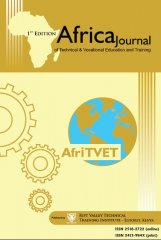
The UNESCO-UNEVOC International Centre: Who We Are | What We Do | Working With Us | Get in Touch
The UNEVOC Network: Learn About the Network | UNEVOC Network Directory
For Members: UNEVOC Centre Dashboard
Thematic Areas: Inclusion and Youth | Digital Transformation | Private Sector Engagement | SDGs and Greening TVET
Our Key Programmes & Projects: BILT: Bridging Innovation and Learning in TVET | Building TVET resilience | TVET Leadership Programme | WYSD: World Youth Skills Day
Past Activities: COVID-19 response | i-hubs project | TVET Global Forums | Virtual Conferences | YEM Knowledge Portal
Our Services & Resources: Publications | TVET Forum | TVET Country Profiles | TVETipedia Glossary | Innovative and Promising Practices | Toolkits for TVET Providers | Entrepreneurial Learning Guide
Events: Major TVET Events | UNEVOC Network News

| Author/s: | Prof Bonaventure W. Kerre (Ed.) |
| Publisher/s: | RVTTI |
| Published: | 1st edition 2016 in Kenya |
| Licence: | CC BY |
| ISSN: | 2518-2722 |
Increased competition in global markets for more and better quality products and services has exerted more pressure and demands on TVET to provide a better skilled and more innovative workforce in each society around the globe. It is in this regard that scholars are invited to dialogue and share their researched findings and experiences in the new AfriTVET scholarly journal as they respond to the above demands and challenges. The AfriTVET is a peer reviewed print and online journal for the wider African region with an international perspective and readership. In this inaugural edition, several papers presented address key issues that have wider implications on the effectiveness of TVET. There are articles that address long-term issues of pathways and inclusiveness to ensure access and lifelong learning and training that may lead to economic security. With the advent of Information and Communication Technology, TVET stands to gain more especially with flexible learning opportunities such as the use of smart phones. It has become increasingly necessary to review the traditional industrial attachment system in consideration of rapidly changing technologies. Business and industry who are the major beneficiaries of TVET graduates should be encouraged to take full participation in the design and development as well as implementation of TVET programmes. Several other articles on crosscutting themes including performance in Physics and other essential subjects for TVET trainees have been examined.